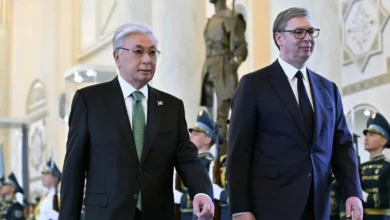49 years on, Turkiye’s Peace Operation in Cyprus still echoes
Ankara exercised its rights as a guarantor and on July 20, 1974 launched a peacekeeping operation in Cyprus.
49 years have passed since the start of the Turkish Armed Forces peacekeeping operation in Cyprus aimed at protecting the rights of the Turkish community on the island, Turanews.kz reports citing Anadolu Agency.
The events that led to the operation in Cyprus began in 1959, when Türkiye, Great Britain, Greece, and the Turkish and Greek communities of Cyprus signed the Zurich and London agreements, which paved the way for the creation of the Republic of Cyprus.
All three countries (Türkiye, Great Britain, and Greece) served as guarantors of this process.
%2FNew-folder-163-_20210720_2_49279558_67190225.jpg)
In the Constitution of the Republic of Cyprus, which was created in 1960 in accordance with international treaties and based on the partnership between Turkish Cypriots and Greek Cypriots, the two peoples were granted equal political rights and status.
However, since 1963, armed groups of Greek Cypriots began to attack representatives of the Turkish community on the island. By force and pressure, the Turkish Cypriots were removed from power on the island.
The goal of the Greek community was the annexation of Cyprus to Greece. In 1963-1974, pressure on the Turkish community in Cyprus increased.
One of the leaders of the EOKA-B group, Nikos Sampson, with the support of the military junta in power in Greece, rebelled in Cyprus and overthrew the island’s president, Archbishop Makarios.
Immediately after that, a meeting of the Turkish National Security Council was convened in Ankara. At the end of the meeting, Turkish Prime Minister Bülent Ecevit instructed to begin preparations for the landing of troops on Cyprus.
Criticism of the world community regarding the military regime in Cyprus created favorable conditions for Ankara’s further actions.
However, other guarantor countries did not support Türkiye’s initiative. Nevertheless, Ankara exercised its rights as a guarantor and, taking into account the issue of ensuring the security of the Turkish Cypriots, on July 20, 1974, launched a peacekeeping operation in Cyprus.
The head of the Turkish government, Bülent Ecevit, in his historic speech on the start of the operation, expressed confidence that Türkiye’s actions would contribute to achieving peace in Cyprus.
“I hope that armed clashes and bloodshed will be avoided. We sent our troops to the island not for war, but in the name of peace. Türkiye stands for peace not only for the Turkish, but also for the Greek community of Cyprus,” Ecevit said.
%2FNew-folder-155-_20210720_2_49279558_67190247.jpg)
The peacekeeping operation in Cyprus was completed at 17:00 on July 22, 1974, at the call of the UN.
Against the backdrop of the failure of negotiations in Geneva, on August 14, the second stage of the operation began. On August 16, a ceasefire was announced. The operation was successfully completed, and the security of the Turkish Cypriots was ensured.
After the operation, the Turkish Cypriots created their own administration.
Immediately after the operation that led to the current borders in Cyprus, on October 1, 1974, an autonomous Turkish Cypriot administration was established.
On February 13, 1975, the Turkish Federated State of Cyprus was proclaimed. The Turkish Cypriots at that time already had the experience of strengthening the state structure, creating a Constitution, and moving to a multi-party system.
On November 15, 1983, the Parliament of the Turkish Federated State of Cyprus unanimously decided to establish the Turkish Republic of Northern Cyprus (TRNC).
The proclamation of the TRNC was an important turning point: with the help of the phenomenon of the state, the Turkish Cypriots announced to the world their political presence on the island.
The right of the Turkish Cypriots to self-determination was also proclaimed.
Negotiations on Cyprus began in 1968, but they have never been successful.
In June 1968, negotiations began in Beirut between the founding president of the TRNC, Rauf Denktash, and the leader of the Greek community of Cyprus, Glafcos Clerides, to resolve the Cyprus problem.
The Greek Cypriots have always rejected steps towards a settlement of the Cyprus problem, including UN proposals, under various pretexts. Or the Greek Cypriots came up with proposals unacceptable to the Turkish side.
Thus, for more than 50 years, negotiations have not been successful, contrary to the constructive position of the Turkish Cypriots.
TRNC President Ersin Tatar, who was elected to the post of head of state in October 2020, advocates the Ankara-supported model of “creating two states on the island”, which is based on the principles of sovereign equality, coexistence, and cooperation.



